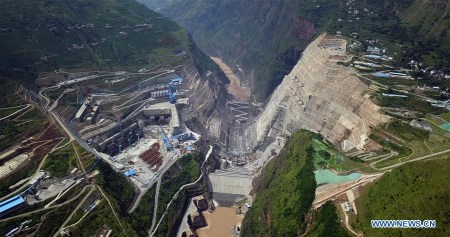
Aerial photo taken on July 27, 2017 shows the construction site of Baihetan project, which is located downstream of the Jinsha River, the upper section of the Yangtze, in Ningnan county of southwest China's Sichuan Province and Qiaojia county of neighboring Yunnan Province. Building work on what will be the world's second largest hydropower station started on Aug. 3, 2017. (Photo/Xinhua)
China on Thursday began construction on the world's second-largest hydropower station on the upper reaches of the Yangtze River, amid environmentalists' concerns over river pollution and geological damage.
Located on the downstream Jinsha River where Ningnan county of Southwest China's Sichuan Province borders Qiaojia county of Yunnan Province, the Baihetan Hydropower Project (Baihetan), with a planned capacity of 16 gigawatts, began the construction of the dam after over 16 years of survey and preparation, according to a statement sent by China Three Gorges Corporation on Thursday.
Following the construction of Xiluodu, the world's third-largest hydropower station, and Xiangjiaba, China's third-largest hydropower station, the construction of Baihetan marks another milestone in China's energy development, said the statement.
According to the statement, Baihetan has a normal impounding level of 820 meters and a corresponding reservoir capacity of 17.9 billion cubic meters. The station could generate an average of 62.4 billion kilowatt-hours of electricity annually, which is equal to two-thirds of Beijing's electricity consumption in 2015.
However, the dam, located in a seismic fracture zone, has triggered grave concerns among Chinese environmentalists and geologists.
Wang Yongchen, a 62-year-old journalist-turned-environmentalist, said that her team, consisting of several environmental journalists and experts, conducted some research on the dam in 2015 and found that along with the water storage and blow-off, the reservoir sediments and fragile geological elements (such as mud rock flows) may cause tremendous damage to the land.
The decision to build the dam has also spurred frantic exploration of local mines. Some of the mining is led by small factories which have no awareness of environmental protection, therefore, a large amount of heavy metal material has been dumped into the Jinsha River's tributary, eventually moved into the Jinsha River, seriously polluting the water, said Wang.
But China Three Gorges Corporation said in the Thursday statement that the station will play an important role in restoring the eco-environment of the Yangtze River. "It could help reduce consumption of coal for 19.68 million tons as well as emissions of carbon dioxide and sulfur dioxide," according to the statement.
In 2016, Chinese President Xi Jinping stressed on ecological protection and "green development" in boosting the growth of the Yangtze River Economic Belt. Restoring its ecological environment will be an overwhelming task and no large-scale development will be allowed along the river at present and for a rather long period to come, Xi said.


















































